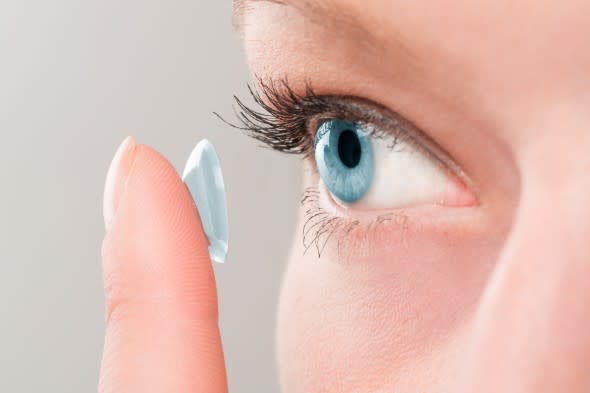Why you shouldn't wear your contact lenses when you're sick with a cold
If you find yourself battling the common cold this winter, ditching your contact lenses might be your best bet if you want to recover much faster, experts say.
Wearing contact lenses while you're ill can do more harm than good, and limiting your use of them when you have a cold or other upper respiratory infection can protect you and others from feeling worse, according to Dr. Howard R. Krauss, a surgical neuro-ophthalmologist at Providence Saint John's Health Center in Santa Monica, California.
"Most upper respiratory infections are viral and are spread by our own fingers to our own face or eyes or to tissues, napkins, towels or moist surfaces, which may then be touched by others," Krauss told AccuWeather.
"Even in the absence of symptoms, your eyes' mucus membranes or tears may already contain live virus ready to inoculate others when carried by your contact lens materials and their handling by you," he said.

(Photo/scyther5/Getty Images)
They can spread infection
One reason to avoid contacts while sick is that these foreign bodies on your eyes can further aggravate and potentially spread infection to eyes already irritated by typical cold symptoms.
"To a small degree, any contact lens may be a source of eye irritation and often also reduces the oxygenation of the cornea, especially during a nap or sleep," Krauss said.
"In the presence of an infection, the continued handling and use of contact lenses may spread infection to the eye, and in the presence of contact lenses, the infection poses greater risk to the health of the eye," he said.
If your cold has already resulted in an eye infection, leaving you with tearing and secretions from your eyes, these tears and secretions likely contain viruses and bacteria that can contaminate other people or can extend deeper into your eyes when they are irritated by your lenses, according to Krauss.
Contact lens wear while sick with a cold can lead to conjunctivitis, or pink eye, which is usually caused by the same virus that causes the common cold, said Dr. Lisa Park, ophthalmologist at Columbia Doctors and associate professor of ophthalmology at Columbia University Medical Center in New York City.
"We know that there is bacteria that is held into place; it's considered a biofilm," Park said. "If you have any infectious processes going on, it's just not a good idea to have that on the surface of the eyes, where that can't be washed away by your natural immune system and the tears."
"That's why we tell people not to wear contact lenses; we can consider them infectious when you have something that's going on in the surface of the eyes," Park added.
They can cause discomfort in dry eyes
In cold weather, people commonly suffer from dry eyes when there is less humidity in the air.
An eye infection, paired with dryness, can cause your eyes to itch, making it more likely that you'll end up rubbing your eyes and raising the risk of damaging your eyes or spreading the infection.
When you're sick and taking medications like antihistamines or decongestants to treat the illness, those remedies can further exacerbate your dryness, said Park.
"The medicines themselves can make you feel uncomfortable, and usually, if people try to wear contact lenses in the setting of dry eyes, it's just uncomfortable," she said.
How to limit your chance of eye infection
As you recover from your cold, medical experts recommend avoiding contact lens wear until you're feeling better.
"For people waking up in the morning with crusting on their eyes, as long as you have that, you should not be putting contact lenses in," Park advised.
She also recommends avoiding eye makeup like eyeliner or mascara, as these items could potentially be infected, also.
"Usually I tell people, start with a clean slate," Park said. "Throw everything away, or at least understand that those things can be contaminated, and for the duration of that infection, don't have anything touching your eyes."
If there is any discharge present in your eyes, Park recommended waiting until one week after the discharge goes away before resuming contact lens wear.
Other ways to limit risk of eye infection include frequent hand washing and avoiding shared towels, foods, drinks or utensils.
"Limit direct contact with those who may tell you they are ill or who display symptoms," Krauss said. "When you are sick, protect yourself and others; work actively to limit the spread of infection and limit contact lens use."
How can you stay healthy this winter season? Tune in to find out! Join host Regina Miller and her guest Dr. Anthony Ng, Senior Physician Executive at Northern Light Acadia Hospital and Chief of Psychiatry at Northern Light Eastern Maine Medical Center as they discuss Seasonal Affective Disorder (SAD) as a type of depression that's related to changes in seasons. Also, Staff Education Coordinator for Centre LifeLink EMS, Frank Cianfrani discusses cardiac and respiratory care as it relates to winter activities and provides suggestions on how to stay safe this winter.
For more safety and preparedness tips, visit AccuWeather.com/Ready.


